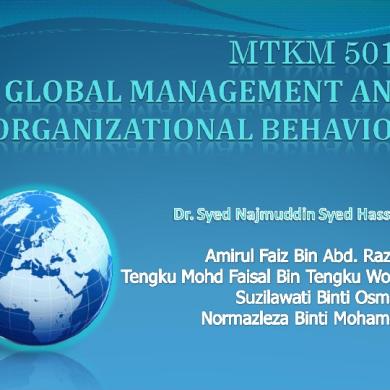Mtkm 5013 Global Social Responsibility
This document was uploaded by user and they confirmed that they have the permission to share it. If you are author or own the copyright of this book, please report to us by using this DMCA report form. Report DMCA
Overview
Download & View Mtkm 5013 Global Social Responsibility as PDF for free.
More details
- Words: 507
- Pages: 33
Countrywide & The Mortgage Industry Crisis Global Warming Martha Stewart & Enron De Beers & Diamond Mining Sweat Shops Employment of Illegal Aliens / Foreign
Workers
Ethics Global Social Responsibility Human Rights & Corruption Promoting Ethics in Transnational Companies
Oxford Definition Ethics | plural noun 1. [usu. treated as pl.] moral principles that govern a person’s or group’s behavior : JudeoChristian ethics. • the moral correctness of specified conduct : the ethics of euthanasia. 2. [usu. treated as sing.] the branch of knowledge that deals with moral principles.
Standards of Right & Wrong Establishing a standard of conduct, belief
values, and sensitivity.
Guidelines for making decisions that effect
employees, the organization, consumers, and other parties. The importance of managerial ethics
increases in proportion to the importance of the outcome.
Behavior that focuses on supposed short term
advantages without considering mid- and long-term consequences.
12% of Brazil’s Amazon charcoal works still
use slave labor despite ban by Citizen’s Coal Institute (regional industry watchdog since 2004) 1,500 charcoal works operate in this region 316 charcoal works shut down due to infractions U.S. buyers concerned about doing business with unethical charcoal works – ethics perception.
Social Economic Human Asset
Transnational Firm Viewpoint Actively solve host-country problems Simply doing business is addressing local
social, human asset, and economic problems Earn a profit
Internal Beneficiaries Employees Customers Owners
External Beneficiaries Special-interest groups Racial and ethnic minorities Women Handicapped Aged Groups that succeed in having laws made Equal Employment Opportunity Affirmative Action
General External Beneficiaries Solve or prevent general social problems Stakeholder management devices Ethics committees Public Affairs Office Code of Ethics Corporate Sponsorship Employee Newsletters
Global Social Responsibility
Basic standards of treatment for all people,
regardless of :
Religion Economic status
Gend er
Race
Nationality
Forced labor and inhumane working
conditions are examples of human rights violations Companies implement policies and programs to avoid violations and are regulated by global groups, such as Amnesty International
No longer acceptable International and national laws governing corruption, bribery, and fraud are becoming increasingly pervasive
Why should a transnational company consider
ethics? 1. Combat human rights violations 2. Good ethics is good business
Good ethics is good business Ethical standards can be considered an asset Special efforts and cost
Reputation
• Investing in ethical behavior may yield short term profit loss • Unethical behavior results in public outcry, legal action, and extended loss of profits • Investment may be balanced-out by a gain in reputation • Reputation of a company is one of the most valuable assets even if not in the balance sheet
How does a transnational company promote
ethics? No one successful approach Ethics most effective when a part of a company’s culture
Successful Strategies for Promoting Ethics
No universal set of standards Situation Country Context Review and consider each host country
separately
Ethics Standards of right and wrong
Social Responsibility Social, economic, and ethical decision making Human Rights Basic standards of treatment for all people
Promoting Ethics Importance of firms to implement ethics standards
Prevalent today as shown in articles covered Ethics Quiz
Workers
Ethics Global Social Responsibility Human Rights & Corruption Promoting Ethics in Transnational Companies
Oxford Definition Ethics | plural noun 1. [usu. treated as pl.] moral principles that govern a person’s or group’s behavior : JudeoChristian ethics. • the moral correctness of specified conduct : the ethics of euthanasia. 2. [usu. treated as sing.] the branch of knowledge that deals with moral principles.
Standards of Right & Wrong Establishing a standard of conduct, belief
values, and sensitivity.
Guidelines for making decisions that effect
employees, the organization, consumers, and other parties. The importance of managerial ethics
increases in proportion to the importance of the outcome.
Behavior that focuses on supposed short term
advantages without considering mid- and long-term consequences.
12% of Brazil’s Amazon charcoal works still
use slave labor despite ban by Citizen’s Coal Institute (regional industry watchdog since 2004) 1,500 charcoal works operate in this region 316 charcoal works shut down due to infractions U.S. buyers concerned about doing business with unethical charcoal works – ethics perception.
Social Economic Human Asset
Transnational Firm Viewpoint Actively solve host-country problems Simply doing business is addressing local
social, human asset, and economic problems Earn a profit
Internal Beneficiaries Employees Customers Owners
External Beneficiaries Special-interest groups Racial and ethnic minorities Women Handicapped Aged Groups that succeed in having laws made Equal Employment Opportunity Affirmative Action
General External Beneficiaries Solve or prevent general social problems Stakeholder management devices Ethics committees Public Affairs Office Code of Ethics Corporate Sponsorship Employee Newsletters
Global Social Responsibility
Basic standards of treatment for all people,
regardless of :
Religion Economic status
Gend er
Race
Nationality
Forced labor and inhumane working
conditions are examples of human rights violations Companies implement policies and programs to avoid violations and are regulated by global groups, such as Amnesty International
No longer acceptable International and national laws governing corruption, bribery, and fraud are becoming increasingly pervasive
Why should a transnational company consider
ethics? 1. Combat human rights violations 2. Good ethics is good business
Good ethics is good business Ethical standards can be considered an asset Special efforts and cost
Reputation
• Investing in ethical behavior may yield short term profit loss • Unethical behavior results in public outcry, legal action, and extended loss of profits • Investment may be balanced-out by a gain in reputation • Reputation of a company is one of the most valuable assets even if not in the balance sheet
How does a transnational company promote
ethics? No one successful approach Ethics most effective when a part of a company’s culture
Successful Strategies for Promoting Ethics
No universal set of standards Situation Country Context Review and consider each host country
separately
Ethics Standards of right and wrong
Social Responsibility Social, economic, and ethical decision making Human Rights Basic standards of treatment for all people
Promoting Ethics Importance of firms to implement ethics standards
Prevalent today as shown in articles covered Ethics Quiz
Related Documents

Mtkm 5013 Global Social Responsibility
May 2020 5
Social Responsibility
June 2020 10
5013
April 2020 2
Social Enterprise And Social Responsibility
July 2020 7
Corporate Social Responsibility Tisco
June 2020 30
Corporate Social Responsibility
May 2020 42More Documents from "Vidhu Jain"

Mtkm 5013 Global Social Responsibility
May 2020 5
Aquarium Ornamental
May 2020 13
Ball Bond Lifting
May 2020 5

